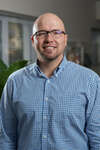The presence of microbial pathogens in both air and water poses a health risk and is a cause of disease in humans. Researchers at Stellenbosch University developed a biosensor nano-chip using ZnO nanowires to detect pathogenic infections at an early stage. The biosensor may also be used to detect pathogens in water.
The new biosensor nano-chip that is used for the detection of immunoglobulins and antibodies consist of gold-coated ZnO nanowires onto which biomolecules capable of forming specific interactions with target biomolecules are immobilised. In use, the association of target biomolecules with the nanowires results in a piezoelectric signal. The signal can be analysed to allow for the quantification of the amount of target biomolecules present. The biosensor has improved sensitivity and selectivity in comparison to existing biosensors. The biosensor provides a rapid antibody-antigen detection method.
The biosensor consists of gold coated ZnO nanowires that act as piezoelectric transducers for the detection of antibodies or antigens. The ZnO nanowires (with a diameter of 78 nm) are hydrothermally grown from a ZnO seed layer (with a diameter 89 nm) on a silicon wafer. The resulting nanowires are biocompatible so that the biosensor can be encapsulated and swallowed by a patient for in vivo detection of biomolecules. The biosensor produces a piezoelectric voltage signal when the nanowires are displaced or bent by the association of antibodies or antigens with the nanowires.
Water treatment facilities
Health care facilities
A distinctive feature of the biosensor is that the gold-coated ZnO nanowires are biocompatible, chemically stable and non- toxic, which make them excellent candidates as transducers for biosensors. The biosensor is relatively inexpensive to manufacture and easy to use.
Prof Leon Milner Theodore Dicks, Department of microbiology, Stellenbosh university
Prof Willem Perold, Department of electric and electronic engineering, Stellenbosch University
Mr Deon Pieter Neveling, Department of microbiology, Stellenbosh university Thomas Stanley van den Heever, Department of microbiology, Stellenbosh university
